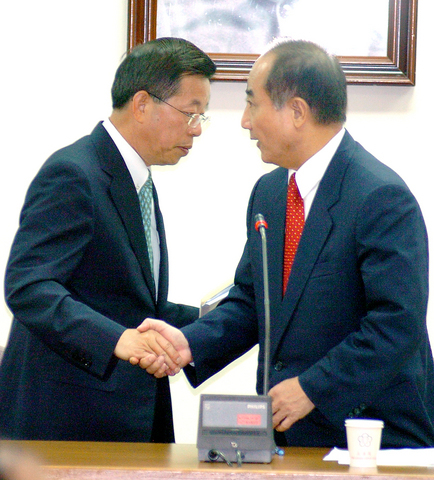Despite Premier Frank Hsieh's (謝長廷) unprecedented visit to the legislature during the summer recess, a second-round of cross-party negotiations on holding a special legislative session failed to bear fruit yesterday.
Legislative Speaker Wang Jin-pyng (王金平) ruled that an informal plenary talk will be held next Friday to discuss the issue again as well as what bills would be screened during the session.
Wang also suggested that the next legislative session start on Sept. 13, about two weeks earlier than usual.

PHOTO: LIAO CHEN-HUEI, TAIPEI TIMES
The Democratic Progressive Party (DPP) caucus wanted the plenary talk to be held either Monday or Tuesday, but Wang said next Friday would be more appropriate because government agencies need more time to include lawmakers' opinions into the proposed eight-year, NT$80 billion flood-fighting program.
Opposition caucuses also need time to map out their own version of the flood-prevention bill, Wang said.
"The next few days will be critical," Wang said. "I'm afraid the DPP caucus will be the biggest loser if they still refuse to budge."
The DPP caucus wants to get six priority bills passed during the special session. It plans to put its proposal to a vote at the plenary talk if necessary.
Opposition caucuses, however, may use their numerical advantage to veto the DPP's proposition.
Before yesterday's meeting, Hsieh led a team of government officials to brief lawmakers about the flood-fighting proposal.
Hsieh said government flood-fighting efforts during the Chinese Nationalist Party (KMT) administration had failed to resolve the problem and that the proposed project was approved by the Executive Yuan in May, not at the last minute.
Although opposition caucuses said they agree the flooding problem needs desperately to be addressed, they don't like the government's proposal.
The People First Party (PFP) caucus walked out of the meeting as Hsieh was answering legislators' questions, claiming that lawmakers were not given enough time to voice their opinions.
One representative from each caucus was given three minutes to discuss the proposal.
The PFP caucus also refused to dispatch any representative to attend the inter-party talk which followed Hsieh's briefing.
Calling the government's flood-control plan as "crudely prepared," PFP Legislator Chang Hsien-yao (
"How do they expect us to believe that the government is well prepared to do the job when there is no feasibility assessment nor a clear goal set in its report," he said.
PFP Legislator Li Yong-ping (李永萍) said the entire project was a political ploy to court southern voters for the year-end city mayor and county commissioner elections.
KMT caucus whip Lai Shyh-bao (
Lai also criticized the government's plan as "roughly sketched."
"The NT$80 billion bill contains only seven articles and 1,600 words -- or NT$50 million per word," Lai said.
"I'm very curious to know as to why the premier's predecessors failed to solve the flooding problem despite spending more than NT$20 billion a year over the past five years, but Premier Hsieh thinks he can do it with an investment of NT$10 billion a year for the next eight years," he said.
Taiwan Solidarity Union (TSU) caucus whip David Huang (
Huang, however, requested the government clearly stipulate the ultimate goal of the project and the source of its funding.
Independent Aboriginal Legislator May Chin (

Alain Robert, known as the "French Spider-Man," praised Alex Honnold as exceptionally well-prepared after the US climber completed a free solo ascent of Taipei 101 yesterday. Robert said Honnold's ascent of the 508m-tall skyscraper in just more than one-and-a-half hours without using safety ropes or equipment was a remarkable achievement. "This is my life," he said in an interview conducted in French, adding that he liked the feeling of being "on the edge of danger." The 63-year-old Frenchman climbed Taipei 101 using ropes in December 2004, taking about four hours to reach the top. On a one-to-10 scale of difficulty, Robert said Taipei 101

Nipah virus infection is to be officially listed as a category 5 notifiable infectious disease in Taiwan in March, while clinical treatment guidelines are being formulated, the Centers for Disease Control (CDC) said yesterday. With Nipah infections being reported in other countries and considering its relatively high fatality rate, the centers on Jan. 16 announced that it would be listed as a notifiable infectious disease to bolster the nation’s systematic early warning system and increase public awareness, the CDC said. Bangladesh reported four fatal cases last year in separate districts, with three linked to raw date palm sap consumption, CDC Epidemic Intelligence

US climber Alex Honnold left Taiwan this morning a day after completing a free-solo ascent of Taipei 101, a feat that drew cheers from onlookers and gained widespread international attention. Honnold yesterday scaled the 101-story skyscraper without a rope or safety harness. The climb — the highest urban free-solo ascent ever attempted — took just more than 90 minutes and was streamed live on Netflix. It was covered by major international news outlets including CNN, the New York Times, the Guardian and the Wall Street Journal. As Honnold prepared to leave Taiwan today, he attracted a crowd when he and his wife, Sanni,

Two Taiwanese prosecutors were questioned by Chinese security personnel at their hotel during a trip to China’s Henan Province this month, the Mainland Affairs Council (MAC) said yesterday. The officers had personal information on the prosecutors, including “when they were assigned to their posts, their work locations and job titles,” MAC Deputy Minister and spokesman Liang Wen-chieh (梁文傑) said. On top of asking about their agencies and positions, the officers also questioned the prosecutors about the Cross-Strait Joint Crime-Fighting and Judicial Mutual Assistance Agreement, a pact that serves as the framework for Taiwan-China cooperation on combating crime and providing judicial assistance, Liang